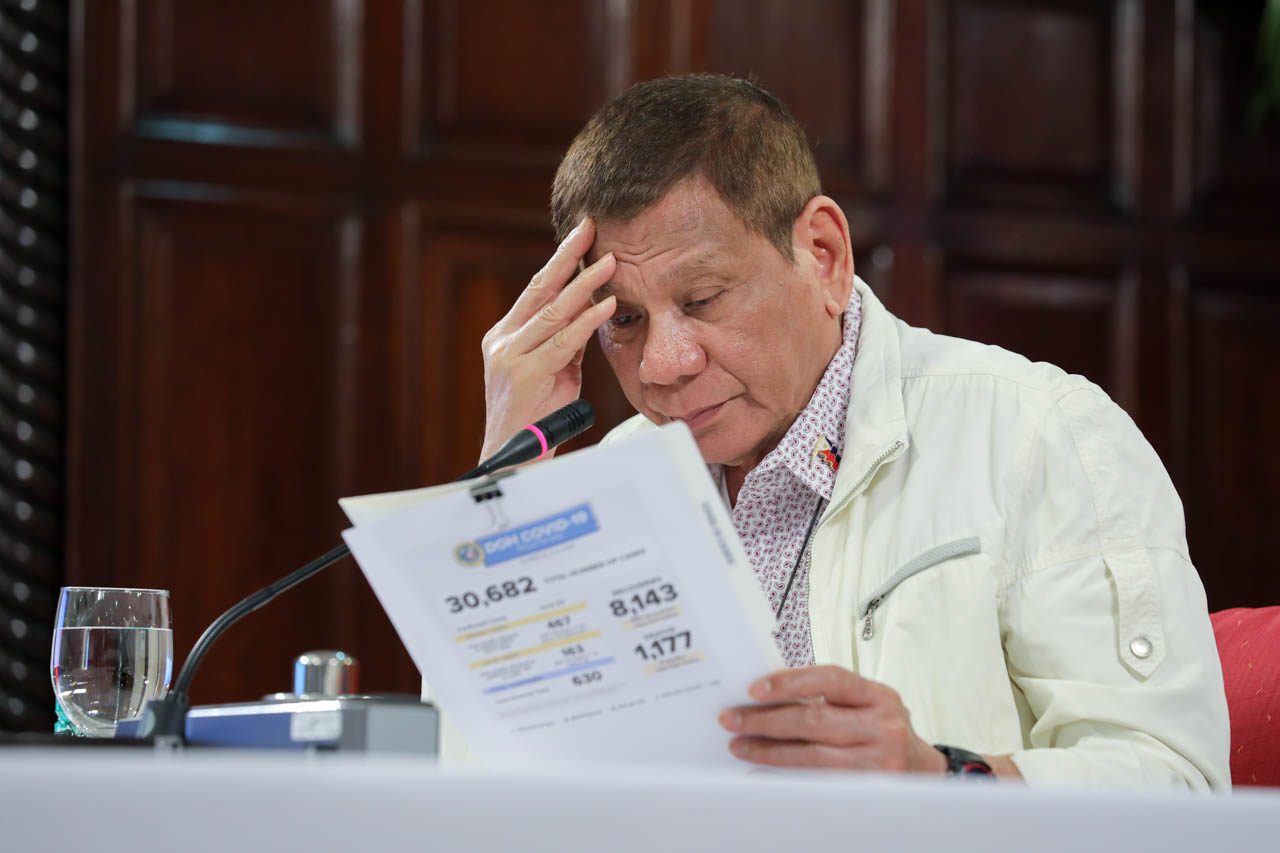SUMMARY
This is AI generated summarization, which may have errors. For context, always refer to the full article.

MANILA, Philippines (UPDATED) – Around this time, citizens should be reading about President Rodrigo Duterte’s satisfaction and trust ratings in the first half of coronavirus-hit 2020.
But because of the pandemic, for the first time both Social Weather Stations (SWS) and Pulse Asia have not been able to conduct their regular quarterly surveys on the President.
It’s yet another pandemic loss as these surveys are highly-anticipated gauges of Duterte’s popularity and give people an idea of public sentiment towards the most powerful man in the country.
Even more crucially, these surveys would have measured public satisfaction with how the President handled the coronavirus outbreak, the biggest crisis to hit his administration. (READ: Pandemic unravels Duterte’s 2016 promise of decisive leadership)
Two surveys missed
Pulse Asia and SWS conduct polls on presidential approval and satisfaction ratings every March and June, which means if they were able to do them this year, they would have captured sentiment during the early months of the pandemic and lockdowns up to the easing of restrictions and reopening of the economy amid a steady rise in infections.
“We haven’t been able to conduct a survey so far this year,” Pulse Asia’s Ana Tabunda told Rappler on Wednesday, July 8.
She explained that Pulse Asia’s surveys on the President involve face-to-face interviews which are not possible given the coronavirus travel restrictions.
Pulse Asia researchers and staff usually travel across Luzon, Visayas, and Mindanao in order to be able to interview a representative sample of the population. They typically interview around 1,500 to 2,000 people across different economic classes.
It’s the same story for SWS.
In a media release, they said their March 2020 face-to-face interviews were cancelled “because the lockdown and lack of public transportation prevented the deployment of field staff.”
“This was the first time for SWS to ever miss a quarterly survey since the first quarter of 1992,” said the poll body.
While SWS was able to conduct a mobile phone survey in early May, their questions focused on aspects of Filipinos’ lives affected by the health crisis – quality of life and hunger, for instance.
Their survey didn’t tackle Duterte satisfaction ratings.
SWS had to limit what questions they could ask from respondents, picked randomly from their database of mobile phone numbers of persons who agreed to be surveyed by phone in the future.
“Compared to a typical face-to-face interview which takes approximately 90 minutes to complete, a phone interview has a maximum limit of 20 minutes due to respondent phone-fatigue,” said SWS.
With the recent lifting of travel restrictions, it remains to be seen when SWS and Pulse Asia can get back on the field to ask Filipinos for their assessment of Duterte.
Tabunda says Pulse Asia is considering doing a mobile phone survey for Metro Manila.
Full picture of Duterte popularity
Duterte’s last satisfaction and approval ratings were sky-high. The last SWS survey on him, conducted in December last year, showed Filipinos gifting him his highest-ever satisfaction rating, 82%.
The President also got stellar scores from Pulse Asia’s survey around the same time – 87% of respondents said they approved of him then.
Days after these winning scores, the coronavirus crisis arrived in the Philippines. But without the March and June surveys of Pulse Asia and SWS, it’s difficult to get a full picture of how Duterte’s popularity has been affected by the pandemic and his administration’s lackluster response.
In these crucial months, hundreds of thousands of Filipinos lost jobs, the economy shrunk, and thousands of commuters were left stranded by confusing government transportation policies.
Filipinos endured strict stay-at-home orders for weeks, only to end up having to return to work despite a surge in cases and increased risk of infection.
It was also during this time when ABS-CBN had to shut down most of its operations due to a National Telecommunications Commission order. Not long after, Rappler CEO Maria Ressa was convicted of cyberlibel and Duterte certified as urgent the controversial anti-terrorism bill which he eventually signed into law. – Rappler.com
Add a comment
How does this make you feel?
There are no comments yet. Add your comment to start the conversation.